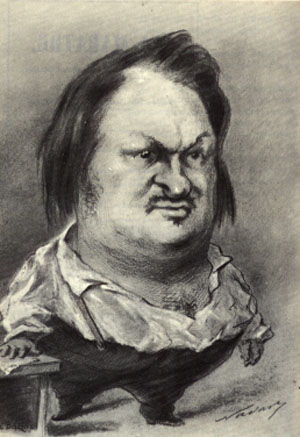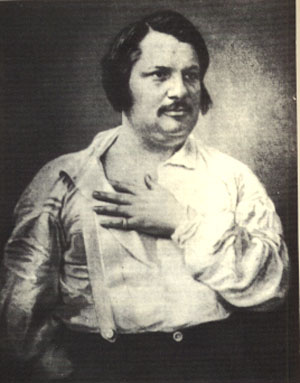conclusions
image banks
--l'assiette au beurre
--Les Quatre Saisons de la Kultur
 |
 |
Excerpt One: From Colonel Chabert
Towards one o'clock in the morning the individua1 calling himself Colonel
Chabert knocked at the door of Maître Derville, solicitor in the
court of common pleas for the department of the Seine. The porter told
him that Monsieur Derville had not yet come in. The old man declared he
had an appointment and passed up to the rooms of the celebrated lawyer,
who, young as he was, was even then considered one of the best legal heads
in France. Having rung and been admitted, the persistent client was not
a little astonished to find the head-clerk laying out on a table in the
dining-room a number of documents relating to affairs which were to come
up on the morrow. The clerk, not less astonished at the apparition of the
old man, bowed to the colonel and asked him to sit down, which he did.
"Upon my word, monsieur, I thought you were joking when you named such
a singular hour for a consultation," said the old man, with the factitious
liveliness of a ruined man who tries to smile.
"The clerks were joking and telling the truth also," said the head-clerk,
going on with his work. "Monsieur Derville selects this hour to examine
his causes, give directions for the suits, and plan his defenses. His extraordinary
intellect works freer at this hour, the only one in which he can get the
silence and tranquillity he- requires to evolve his ideas. You are the
third person only who has been admitted here for a consultation at this
time of night. After Monsieur Derville comes in he will talk over each
affair, read everything connected with it, and spend perhaps five or six
hours at his work; then he rings for me, and explains his intentions. In
the morning, from ten to two, he listens to his clients; the rest of the
day he passes in visiting. In the evening he goes about in societv to keep
up his relations in the outside world. He has no other time than at night
to delve into his cases, rummage the arsenals of the Code, make his plans
of campaign. He is determined, out of love for his profession, not to lose
a single case. And for that reason he won't take all that are brought to
him, as other lawyers do. That's his life; it's extraordinarily active.
He makes a lot of money."
The old man was silent as he listened to this explanation, and his
singular face assumed a look so devoid of all intelligence that the clerk
after glancing at him once or twice took no further notice of him. A few
moments later Derville arrived, in evening dress; his head clerk opened
the door to him and then went back to the papers. The young lawyer looked
amazed when he saw in the dim light the strange client who awaited him.
Colonel Chabert was as motionless as the wax figures of Curtius' gallery
where Godeschal proposed to take his comrades. This immovability might
have been less noticeable than it was, if it had not, as it were, completed
the supernatural impression conveyed by the whole appearance of the man.
The old soldier was lean and shrunken. The concealment of his forehead,
which was carefully hidden beneath a wig brushed smoothly over it, gave
a mysterious expression to his person. The eyes seemed covered with a film;
you might have thought them bits of dirty mother of-pearl, their bluish
reflections quivering in the candlelight. The pale, livid, hatchet face,
if I may borrow that term, seemed dead. An old black-silk stock was fastened
round the neck. The shadow of the room hid the body so effectually below
the dark line of the ragged article that a man of vivid imagination might
have taken that old head for a sketch drawn at random on the wall or for
a portrait by Rembrandt without its frame. The brim of the hat worn by
the strange old man cast a black line across the upper part of his face.
This odd effect, though perfectly natural, brought out in abrupt contrast
the white wrinkles, the stiffened lines, the unnatural hue of that cadaverous
countenance. The absence of all motion in the body, all warmth in the glance,
combined with a certain expression of mental alienation, and with the degrading
symptoms which characterize idiocy, to give that face a nameless horror
which no words can describe.
But an observer, and especially a lawyer, would have seen in
that blasted man the signs of some deep anguish, indications of a misery
that degraded that face as the drops of rain failing from the heavens on
pure marble gradually disfigure it. A doctor, an author, a magistrate would
have felt intuitively a whole drama as they looked at this sublime wreck
whose least merit was a resemblance to those fantastic sketches drawn by
artists on the margins of their lithographic stones as they sit conversing
with their friends.
When the stranger saw the lawyer he shuddered with the convulsive
movement which seizes a poet when a sudden noise recalls him from some
fecund revery amid the silence of the night. The old man rose quickly and
took off his hat to the young lawyer. The leather that lined it was no
doubt damp with grease, for his wig stuck to it without his knowledge and
exposed his skull, horribly mutilated and disfigured by a scar running
from the crown of his head- to the angle of his right eye and forming a
raised welt. The sudden removal of that dirty wig, worn by the poor soul
to conceal his wound, caused no desire to laugh in the minds of the two
young men, so awful was the sight of that skull. "the mind fled through
it!" was the first thought suggested to them as they saw that wound.
"If he is not Colonel Chabert he is some bold trooper," thought Boucard.
"Monsieur," said Derville, "to whom have I the honor of speaking?'
"To Colonel Chabert."
"Which one?"
"The one who was killed at Eylau," replied the old man.